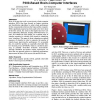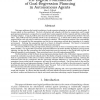350 search results - page 36 / 70 » Complexity of Planning with Partial Observability |
PG
2002
IEEE
14 years 2 months ago
2002
IEEE
Flocking behavior is very common in nature, and there have been ongoing research efforts to simulate such behavior in computer animations and robotics applications. Generally, suc...
ATAL
2010
Springer
13 years 10 months ago
2010
Springer
Memory-bounded techniques have shown great promise in solving complex multi-agent planning problems modeled as DEC-POMDPs. Much of the performance gains can be attributed to pruni...
IUI
2010
ACM
14 years 6 months ago
2010
ACM
Most of the previous work on non-invasive brain-computer interfaces (BCIs) has been focused on feature extraction and classification algorithms to achieve high performance for the...
ICC
2007
IEEE
14 years 3 months ago
2007
IEEE
— We consider opportunistic spectrum access (OSA) which allows secondary users to identify and exploit instantaneous spectrum opportunities resulting from the bursty traffic of ...
AI
1998
Springer
13 years 8 months ago
1998
Springer
This paper addresses the logical foundations of goal-regression planning in autonomous rational agents. It focuses mainly on three problems. The first is that goals and subgoals w...


